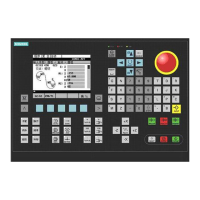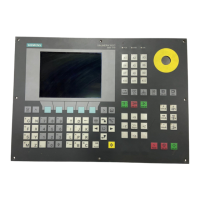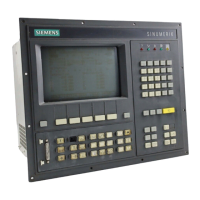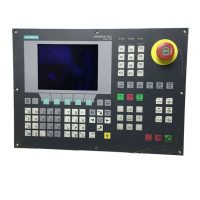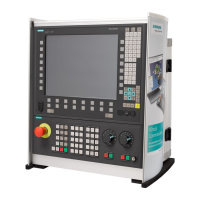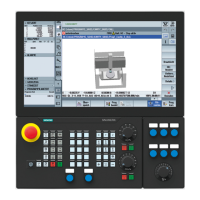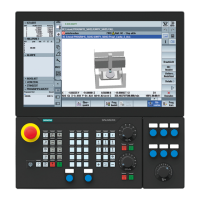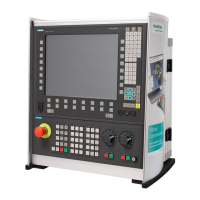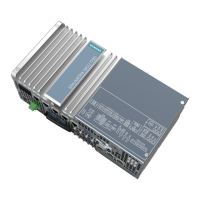P3: Basic PLC Program for SINUMERIK 840D sl
13.8 Structure and functions of the basic program
Basic Functions
902 Function Manual, 09/2011, 6FC5397-0BP40-2BA0
MCP failure normally switches the PLC to the STOP state. If this is unwanted, then OB 82, OB 86 can be used to
avoid a PLC stop. The basic program has, as standard, the OB 82 and OB 86 call. FC5 is called in these OBs.
This FC5 checks whether the failed slave is an MCP. If this is the case, no PLC stop is triggered. The input
address at parameter MCPxIn is of significance when monitoring for MCPxIn failure.
Setting MCPxStop := True causes the basic program to deactivate the MCP as a slave via SFC 12. If the PLC
does not switch to the stop state following the failure of or a fault on the MCP, an alarm message will be
generated via the basic program. The alarm is deleted when the station returns.
13.8.12 Switchover of machine control panel, handheld unit
Only Ethernet variants support switchover/deactivation of the machine control panel (MCP) or handheld unit
(HHU) as standard. On MPI and PROFIBUS variants, this function is either not supported at all or can only be
implemented in restricted format requiring additional effort on the part of the user. For example, with the
PROFIBUS variant of the MCP, the DB77 data area specified for MCP1, MCP2 or HHU can be used for the MCP
pointer on FB1. The MCP slave bus address must be set correctly under MCPxBusAdr as this is used as the
basis for monitoring. A user program copy routine to copy the signals of the active MCP from the I/O area
configured in HW Config to DB77. This enables a number of MCPs on the PROFIBUS to be switched via signals.
Set the MCPxStop parameter to True for the switchover phase from one MCP to another.
One method will be outlined now with the Ethernet variants of MCP and HHU.
Control signals
Parameters MCP1Stop, MCP2Stop and BHGStop can be used to stop communication with individual
components (parameter setting = 1). This function is available only on Ethernet variants. This stop or activation of
communication can be applied in the current cycle. However, the change in value must be implemented through
the symbolic notation of the parameters and not by means of another FB 1 call.
Example of stopping transfer from the 1st machine control panel:
Setting parameters MCP1Stop, MCP2Stop, BHGStop also results in a suppression or deletion of interrupts
400260 to 400262.
MCP1Cycl MCP2Cycl BHGTimeout (n.r.)
MCPMPI = FALSE BHGCycl (n.r.)
MCP1Stop MCP2Stop BHGRecGDNo
MCPBusType = b#16#36 BHGRecGBZNo (n.r.)
BHGRecObjNo (n.r.)
MCPSDB210= FALSE BHGSendGDNo (n.r.)
MCPCopyDB77 = FALSE BHGSendGBZNo (n.r.)
BHGSendObjNo (n.r.)
BHGMPI = FALSE
BHGStop
SET;
S gp_par.MCP1Stop;
Relevant parameters (FB1)
MCP HHU
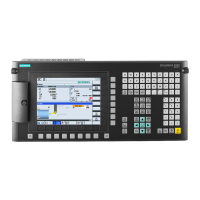
